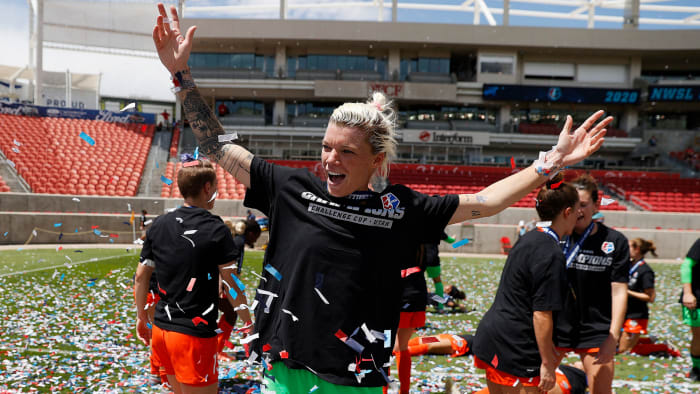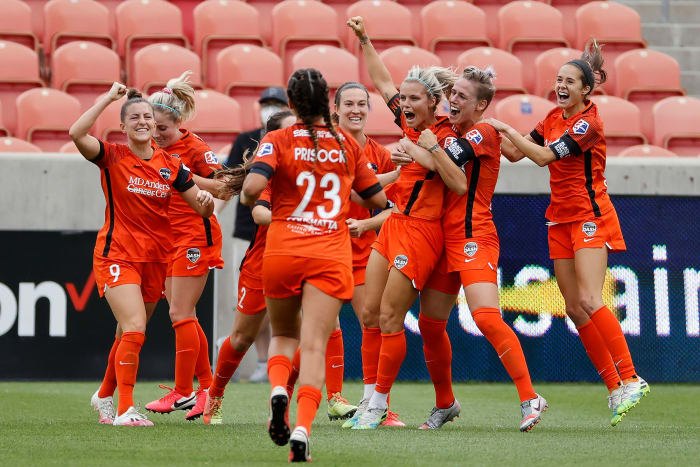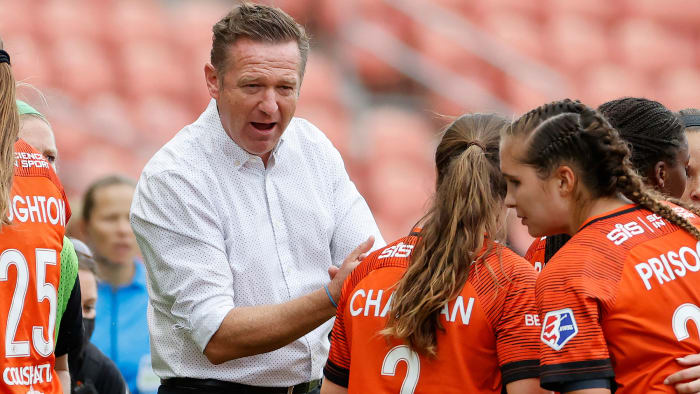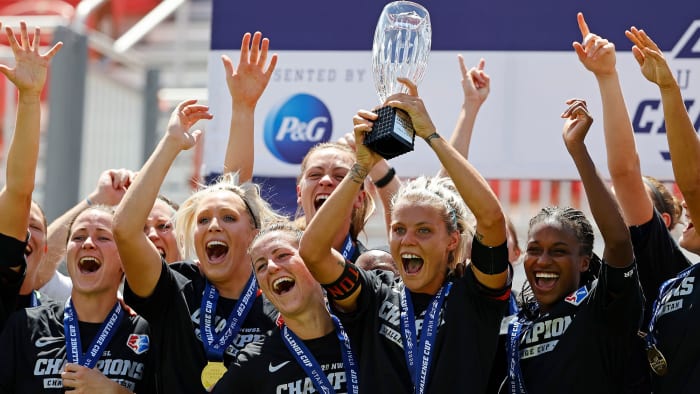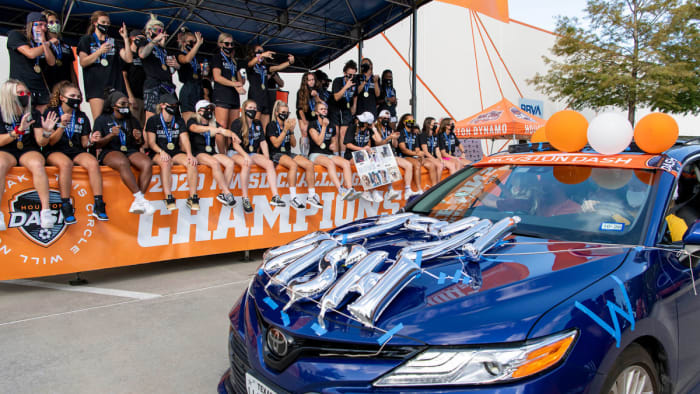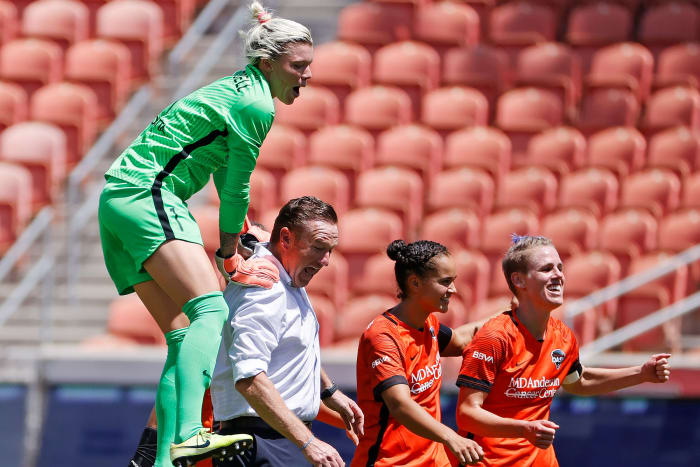The Houston Dash's Five-Step Process to Flip the Script and Build an Unbreakable Circle
A little over a month before the 2020 NWSL preseason kicked off, Shea Groom was nearly 3,000 miles away from her club, the Tacoma-based Reign FC.
In New York City for an offseason internship with Budweiser, the midfielder had just finished a rooftop game of pickup soccer and was walking the streets an hour before midnight when she received career-changing news.
“I’ll never forget,” Groom says.
Groom was informed that she, along with teammate Megan Oyster, had been traded to the Houston Dash. For the third straight offseason, Groom would need to uproot her life, moving across the country to join her fourth professional team since being drafted into the NWSL out of Texas A&M in 2015.
Four teams in six years is hard on any athlete, let alone ones in the NWSL, where annual salaries start at only $20,000. But for Groom, this trade also meant leaving a club that was coming off its second straight playoff appearance for one that had never even played in an elimination game.
Through six years in the league, it was no secret that the Dash’s history was rough: 40 wins, 63 losses, 26 draws, four different head coaches (including one interim) and annual major roster turnover.
“I was actually really upset and really sad. … It was a lot of tears,” Groom says of her initial reaction to the trade.
“It ended up being a way happier story than that.”
When Vera Pauw departed the Dash after one season on the job in September 2018, the first person to apply for the vacated head coach role was James Clarkson.
Clarkson, then 46, had spent more than a decade with the Houston Dynamo Academy, an MLS youth developmental wing under the same ownership umbrella as the Dash. A native of Wisbech, England, who earned U.S. citizenship in 2013, Clarkson would be named the new Dash head coach by December.
His hiring was perplexing to some, who wondered whether someone with no prior NWSL experience and little history of coaching women could make the successful adjustment. And while Houston was coming off a franchise-high nine-win season, its sixth-place finish (out of nine teams) still left it languishing in the same purgatory that had become common to associate with the league’s lone Texas team.
In introducing Clarkson as head coach, one of the things then Dash managing director Brian Ching stressed was how the organization had been looking for someone “that could make that right connection with players,” citing it as a missing ingredient in the team’s past. The first thing Clarkson did that was different was hire a full-time staff, says starting goalkeeper Jane Campbell, a 2017 Dash draft pick and one of the roster’s longest-tenured members.
“Everyone was paid full-time, and this is their main job, and that was great because it showed commitment from the staff to the players,” she says.
But as is fairly common for first-year NWSL coaches, Clarkson’s first season in Houston didn’t go smoothly. The team started well before hitting a wall during the World Cup window, winning just four of its final 18 games. The low point was a 5–0 July thrashing by the Portland Thorns, in front of 22,329 fans at Providence Park who reveled in every goal the home side scored.
“Our first year with James, it was obviously his first year in the league, so I think he also kind of had this awakening of how we play and how the league is,” says Campbell. “It’s not necessarily the prettiest style of soccer, but it’s probably one of the most exciting because of how transitional it is, so I think that kind of caught him off guard a little bit.”
Some glimmers of optimism showed late in that 2019 season. Houston played the league’s best team, the formidable North Carolina Courage, to a stalemate for nearly 90 minutes in September before a controversial penalty kick earned N.C. a 1–0 victory. Four days later, the Dash faced the Thorns for the first time since the summer’s rout, also only losing 1–0.
“We definitely were able to, at the end of the season, kind of establish a blueprint of how he wants us to play,” Campbell says. “We were really hitting the ground running, and unfortunately we just ran out of time.”
Speak to Clarkson and various members of the Dash, and a pattern emerges around how this franchise sought to change both its reputation and its on-field results.
Step 1: Realize what’s not working and make some hard changes
After the 2019 season ended with an overall record of 7-12-5, Clarkson sensed the need for a shakeup.
“I spoke to the ownership and the front office and the president, and I said, ‘We’ve gotta make changes to the roster if we want to be successful,” he recalls. “If we roll out the same team, we’re gonna get the same result.’ ”
One of the main things Clarkson had to reckon with, though, was inheriting the Dash’s less-than-stellar reputation as an appealing landing spot. Between the losing, outside perceptions of organizational dysfunction and the heat and humidity that come with playing in Houston, they were far from No. 1 on stars’ lists.
In 2015, the franchise had U.S. players Carli Lloyd, Morgan Gautrat (née Brian) and Meghan Klingenberg on its roster all at once, with the latter two even living with former NBA coach Jeff Van Gundy as part of a now-defunct team host family program. By the end of the 2017 season, all three were gone, and, a few months later, the Dash infamously traded for star forward Christen Press, only to see her choose to sign in Sweden rather than join Houston. In 2019 and 2020, it had the distinction of being the only one of the NWSL’s teams without an allocated U.S. national team player on its roster.
“We can’t hide from the fact that Houston wasn’t necessarily a destination that players really wanted to come to,” says Clarkson. “So we’re working hard on and off the field to change that, and talking to the players [we acquired] and making sure that they were bought into what we were trying to achieve. That was really important.”
Between the coach’s desire for change and the wish of some players to seek opportunities elsewhere, significant roster turnover was on the way. Gone were longtime franchise faces Kealia Watt and Amber Brooks, along with more recently acquired standout Sofia Huerta. In via those trades were Groom, a skilled and fearless midfielder who had struggled to replicate her early career success, and a pair of under-the-radar center backs, Oyster and Katie Naughton.
The defenders were “a real priority,” says Clarkson, who was determined to fix the 36 goals the team conceded in 24 games in 2019. Meanwhile, Groom and signee Bri Visalli, a player Clarkson scouted during a trip to England and recruited from the FA WSL, were identified by the staff as an ideal fit for the way Houston wanted to play offensively.
“We knew [Groom] would be able to bring something different to us and her ability to run with the ball would really change things for us on the attack, and we knew the knock-on effects that would have on Rachel Daly, Kristie [Mewis] and Nichelle Prince as well,” the coach says.
“Those three moves were massive for us in changing the whole profile of the team.”
The new additions also brought something that was in scarce supply on Houston’s roster: postseason experience. In particular, Naughton was part of three playoff teams in Chicago, and Groom won an NWSL championship in Kansas City back in 2015.
The work, though, was only just beginning.
Step 2: Get everyone on board
It’s one thing to bring in new talent, and another to get them to invest in and believe in what you’re doing—and that’s doubly true when there’s no track record to back it up. Clarkson, who calls making a connection with players “vitally important,” admits that in Year 1, that connection was just “O.K.” In 2020, there was “a much bigger effort on my part to really try to connect with every single player,” he says.
Naughton recalls a phone call she had with the coach right after being traded to Houston, where Clarkson “was really excited to bring me on. He definitely wanted me to come in and make an impact right away and help solidify the backline.”
For Groom, the one who cried when she first found out she was being sent to the Dash, one moment stands out as when she fully bought into her new team surroundings. Amid a sporadic preseason that was interrupted by the COVID-19 pandemic just four days in, shutting down sports across the United States and leading the NWSL to scrap its planned regular season in favor of a one-month Challenge Cup summer tournament in Utah, the country was also dealing with a racial justice reckoning. The May killing of George Floyd by police in Minneapolis had sparked protests across the country, and Dash players, like many athletes, wanted to take a stand.
“James came to the group for training, and we’d had some hard difficulties as a team already. We were sifting through a lot of things off the field,” recalls Groom.
“He came to the team and said a really powerful message of ‘I’m with you guys, I’m standing with you guys, and we could contract COVID and not go to the Challenge Cup at all, but this is more important and I’m going to march next to every single Black and brown player, white player, in the march [for Floyd] that was in Houston.’ And we did that. And I think that was such a powerful statement for a coach … that could’ve cost him his job, like say we don't go to the Challenge Cup? But he was so bought into caring for us as humans, I knew that this was home for me.”
Step 3: Establish a consistent mentality and style
The roster revamped, it was time for the coaching staff’s vision for a Houston turnaround to hit the field.
For Campbell, the biggest change came from Clarkson instilling a new club mindset for games, particularly with learning to approach the final 20 to 25 minutes the same way, whether they were up 1–0 or down 1–0.
“He’s very driven and very, very motivated to play at the highest level that he wants us to play at, and anything less than that is not acceptable,” she says. “I think that’s a great mentality to have. I think it’s quite a harsh one, but it’s kind of a reality of our job.
“In past years, at least since I’ve been here, I think the Dash have really struggled with an identity; we didn’t really know how we were going to play. The game would go toward the 70th minute, and we still wouldn’t really know what we would have to do to win a game, or hold out a win, stuff like that. Whereas James is very clear on how we’re gonna play and how we’re gonna win and how we’re gonna defend a lead.”
As a goalkeeper, Campbell explains she has the ability to see the whole field and get a strong sense of the ebbs and flows of how a game is going. In previous years, she’d notice that the Dash, lacking depth, “would die out at the 60th minute, and then it’s like, O.K., can we just stop the flood of goals that we’re gonna concede?’ That was kind of the mentality of ‘How do we not lose?’ Whereas with James, it’s been ‘We’re gonna win and we’re gonna keep winning and keep scoring, and how do we keep putting the pressure on the other team so that they can’t get a chance to even come near the goal?’ ”
The first chance to test that new mindset came at the Challenge Cup in Utah. Despite all of the turbulence with the pandemic and the interrupted preseason, the NWSL hierarchy appeared very much intact heading into the tournament. The Courage, coming off back-to-back league championships, were the clear favorite. The Dash were anything but. In fact, sportsbook William Hill had Houston at +1000 odds to win it, while the algorithm at FiveThirtyEight predicted the team to finish last in the field of eight (the Orlando Pride had to withdraw due to COVID-19) and gave it just a 7% chance of taking home the trophy.
“Literally, the betting odds were so [low], we were not even supposed to be in the tournament, essentially,” Campbell quips.
Feeling like no one believed in their improvements—even as they jumped out to a fast start with five goals across their opening two games, and later as they won a penalty shootout in the quarters and a 1–0 thriller in the semis—the Dash developed a mantra in Utah, one repeated often by co-captain Daly in team huddles: “This circle doesn’t break.”
“For us, every win or every time we could advance … every interview people did, in the tournament or outside the tournament, it was always, ‘Oh, you guys are this underdog story,’ ” says Campbell. “And for us, it was like, not really, that’s kind of how we were perceived. … I understand it, but at the same time we were like, ‘Wow, we have this blueprint that we’ve perfected and we’re crushing it, and no one’s really buying that.’
“To me, what the circle represents, and that’s how it started I think, was because everyone went on this story about this underdog team, and it was like, well, we never really thought of ourselves as that. We knew we could perform and play, it’s just a matter of people believing in us.”
Step 4: Turn Steps 1–3 into tangible results
As the seconds ticked down on the Challenge Cup final last July, with the Dash leading the Chicago Red Stars 2–0 after a breakaway stoppage-time goal by Groom, the scene surrounding Houston told it all.
Dash reserves on the sideline clapped jittery hands and jumped in place, harnessing anticipatory energy before unleashing it with a collective roar and sprint onto the field as the final whistle blew. Daly, the fiery English striker and tournament MVP—and the one who has been in Houston longer than anyone on the roster—opened up her arms to catch a leaping Groom. Campbell spread her arms wide and embraced midfielder Sophie Schmidt, a huge grin across the goalie’s face. It would kick off a days-long raucous celebration by the team, including a drive-through, socially distanced car parade back in Houston.
It might’ve just been a one-month summer tournament, played in the middle of a pandemic and with some of the league’s stars opting out, but for the first time in franchise history, the Houston Dash had won. And not just some hardware—though the hardware is certainly nice—but also a level of respect it had never previously commanded. But even after the Dash went out and performed well in the ensuing four-game fall series, coming in second and exploding for 12 total goals, not everyone is convinced.
“I still have friends in the league saying our win last year didn’t mean much, and that it just doesn’t really mean anything because it was a pandemic year, you only played seven games [in the Challenge Cup]. I’ve heard it all,” says Campbell. “I think coming into this year, people still don’t think that we’re really that good, which is fine by us.”
It’s a sentiment shared by Groom—“whatever excuses you want to make [for why other teams didn’t win],” she says to those discrediting the limited 2020 competition. “Something that I said early on is this team, from Day 1 before the Challenge Cup was even announced or thought about, we were like, ‘Whenever we get a chance to end up on the field, we want to win whatever we can win.’ ”
Step 5: Keep the momentum going
The air is a little different around the Houston Dash this spring. They’ll enter the 2021 season—which, fittingly, opens with a second Challenge Cup tournament kicking off Friday before segueing into a normal, 24-game-per-team season—in the unfamiliar position of having plenty of eyes on them as the NWSL world awaits what they will do for an encore.
For Friday night’s opener, they’ll be missing six starters from that July final due to international duties when they host the Red Stars, and possibly just as many during this summer’s Olympic window, for which the NWSL is not breaking. You see, Houston’s national team contingent is no longer just Daly (England) and its three Canadians (Prince, Schmidt and defender Allysha Chapman). Campbell and Mewis, the latter of whom was named Dash MVP in 2020 after a resurgent campaign, have made returns to the U.S. national team after catching the eye of coach Vlatko Andonovski for their NWSL play.
Clarkson believes the pair’s U.S. call-ups and allocation status for 2021 will continue to enhance the profile and change the reputation of his club, while Campbell is quick to note she and Mewis’s increased platform won’t alter the Dash’s team dynamic.
“We’re still the same team, we’re not gonna change our style. … I think that’s kind of what makes us unique and what makes people overlook us is because there’s no, ‘big names’ on our team, but yet we still manage to win and we’re really hard to play against,” she says. “I think the fact that we’ve got a bunch of blue-collar, wallflower players is to our advantage. I mean, people always overlook us, and I’m sure this year, people will still overlook us.”
Still, Houston isn’t likely to catch anyone by surprise in 2021, not after its 2020 breakthrough. And after bringing back every starter from the Challenge Cup final and the majority of the rest of the roster, the Dash finally have the kind of stability that eluded them in years past.
“It was amazing, the first day of preseason training I actually just felt like we had the weekend off,” says Clarkson. “To see those same players come back in with the same attitude and determination to want to achieve more, get more success, we just seem so much further forward then we’ve ever been.”
While no one is anointing Houston the 2021 NWSL favorite based on 11 games—especially in an Olympic year—it’s clear the team enters this season among the hunted rather than its usual role as hunter.
“In years past the Dash haven’t necessarily had that target on their back, so I think now we’re excited that we do, because it’s going to push us to work even harder and maintain our winning streak,” says Naughton.
Both Groom and Clarkson believe the chip on the team’s shoulder is still there, but the coach cautions that it “can’t be the motivating factor in order for us to progress.”
“The motivating factor is to get more success,” he continues. “There’s a real determination in the group. I believe they know that they have the potential to achieve something special.”

